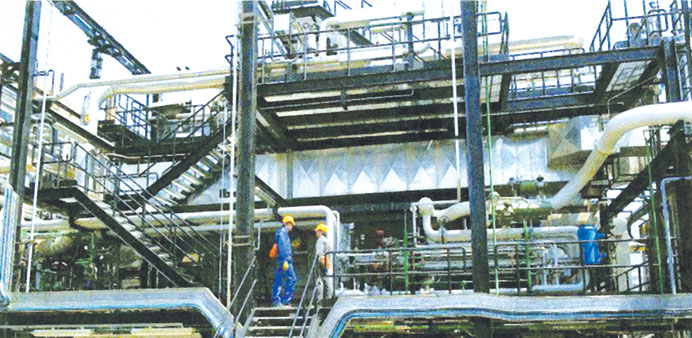Total’s plant for carbon dioxide capture and storage (CCS) at Lacq in southwest France. The 30-thermal megawatt capacity of the oxycombustion process for the carbon dioxide capture makes this one of the largest in the world.
By Pratap John/Lacq, France
Energy major Total’s pilot plant for carbon dioxide capture and storage (CCS) at Lacq in southwest France has helped mitigate greenhouse gas emissions and given a decisive boost to the development of the promising technology.
The pilot facility designed by Total’s R&D team attached to its exploration and production (E&P) has been on stream since January 2010. Recently, some Gulf-based journalists were taken on a tour of this facility close to France’s border with Spain.
Located in the Lacq Basin, it is the “first end-to-end industrial chain” comprising the capture, transport and injection of carbon dioxide into a depleted gas reservoir.
According to the Inter-governmental Panel on Climate Change (IPCC), an industrial scale deployment could account for up to 30% reduction in global carbon dioxide emissions by 2050.
“CCS is especially well-suited to industrial plants with annual carbon dioxide emissions of more than 100,000 tonnes such as coal-fired power plants, steel mills and refineries and is potentially applicable to 7,000 industrial sites worldwide,” Total said.
According to the energy major, the Lacq pilot project is “unique” in many respects.
The 30-thermal megawatt capacity of the oxycombustion process for the carbon dioxide capture makes this one of the largest in the world. A boiler at the complex was retrofitted to use high-purity oxygen for combustion, which yields a highly concentrated carbon dioxide stream in the combustion gases, facilitating capture.
Carbon dioxide is injected into a depleted onshore reservoir, a European first.
Also, unmatched is the integration of the entire industrial chain, which comprises extraction, processing and oxycombustion of the natural gas followed by the capture, transport and injection of carbon dioxide and production of high pressure steam to supply the Lacq industrial complex.
“This far-reaching integration is a world first,” Total said.
Initial results after the plant start-up are “encouraging” Total said. The performance of the surface facilities is on expected level. Accordingly, the industrial feasibility of oxycombustion as a carbon capture technology has now been validated. “Besides being the primary aim of the pilot project, it enables our R&D teams to start studying the scaling up of the oxycombustion process via the development of an industrial oxycombustion boiler with a capacity of 200Mw,” Total said.

